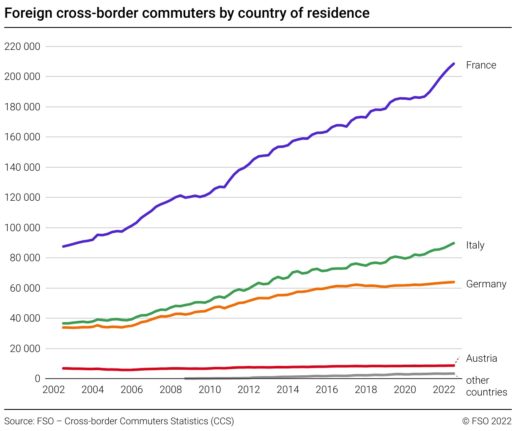Switzerland sees big jump in number of cross-border employees

The number of workers who commute daily from neighbouring countries to their jobs in Switzerland has grown by nearly 6 percent within the past year.
At the end of September, there were approximately 374,000 G-permit holders employed in the country, according to data released by the Federal Statistical Office (FSO) on Thursday.
That is 5.8 percent more than at the same time last year.
Slightly more than half of the cross-border workforce (55.7 percent) live in France, followed by Italy (24 percent), and Germany (17.1 percent).
This FSO chart shows how the number of cross-border workers has grown in the past decade.

What else the new statistics reveal:
- Most of these workers (145,742) are employed in the Lake Geneva region, which encompasses Geneva and parts of Vaud.
- The second largest group (77, 732) are in Ticino, followed by the 73, 632 employed in the northwestern part of the country, which includes Basel and Jura.
- The remainder commute farther away from the immediate border regions.
- The vast majority — 255 214 people — are employed in the so-called ‘tertiary sector’, that is, the service industry. It includes the healthcare sector, which suffers from a shortage of nurses and other skilled medical professionals.
- The second-largest group (116 317) work in the secondary sector, which includes manufacturing.
READ MORE: EXPLAINED: Who can work in Switzerland but live in a neighbouring country?
All of the cross-border commuters have a G-permit that is typically valid for five years — unless it’s a temporary contract, in which case it is valid only for the duration of employment. The permits are limited only to the issuing cantons.
However, the fact of merely living in an EU state doesn’t automatically grant the right to work in Switzerland. If you are a citizen of a third nation, you can still apply for a G permit as long as you have been a legal resident of a country adjacent to Switzerland for at least six months.
A cross-border permit does not grant access to permanent residence (B or C permit), or to Swiss citizenship.
READ MORE: How to get a permit as a cross-border worker in Switzerland
Comments
See Also
At the end of September, there were approximately 374,000 G-permit holders employed in the country, according to data released by the Federal Statistical Office (FSO) on Thursday.
That is 5.8 percent more than at the same time last year.
Slightly more than half of the cross-border workforce (55.7 percent) live in France, followed by Italy (24 percent), and Germany (17.1 percent).
This FSO chart shows how the number of cross-border workers has grown in the past decade.

What else the new statistics reveal:
- Most of these workers (145,742) are employed in the Lake Geneva region, which encompasses Geneva and parts of Vaud.
- The second largest group (77, 732) are in Ticino, followed by the 73, 632 employed in the northwestern part of the country, which includes Basel and Jura.
- The remainder commute farther away from the immediate border regions.
- The vast majority — 255 214 people — are employed in the so-called ‘tertiary sector’, that is, the service industry. It includes the healthcare sector, which suffers from a shortage of nurses and other skilled medical professionals.
- The second-largest group (116 317) work in the secondary sector, which includes manufacturing.
READ MORE: EXPLAINED: Who can work in Switzerland but live in a neighbouring country?
All of the cross-border commuters have a G-permit that is typically valid for five years — unless it’s a temporary contract, in which case it is valid only for the duration of employment. The permits are limited only to the issuing cantons.
However, the fact of merely living in an EU state doesn’t automatically grant the right to work in Switzerland. If you are a citizen of a third nation, you can still apply for a G permit as long as you have been a legal resident of a country adjacent to Switzerland for at least six months.
A cross-border permit does not grant access to permanent residence (B or C permit), or to Swiss citizenship.
READ MORE: How to get a permit as a cross-border worker in Switzerland
Join the conversation in our comments section below. Share your own views and experience and if you have a question or suggestion for our journalists then email us at [email protected].
Please keep comments civil, constructive and on topic – and make sure to read our terms of use before getting involved.
Please log in here to leave a comment.